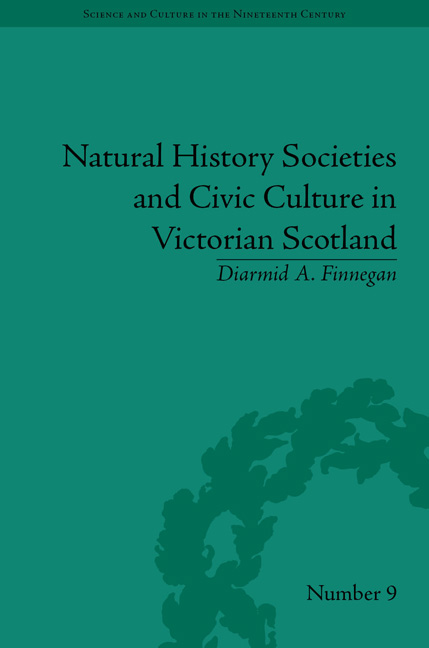Book contents
- Frontmatter
- CONTENTS
- Acknowledgements
- List of Figures and Tables
- Introduction
- 1 Founding Narratives
- 2 Fieldwork and Excursion Culture
- 3 Natural History and Civic Pride
- 4 Natural History and Self Culture
- 5 Organizing Subscriber Science
- 6 Scientific Motives and Civic Virtue
- Conclusion: Between Science and Civic Society
- Notes
- Works Cited
- Index
Conclusion: Between Science and Civic Society
- Frontmatter
- CONTENTS
- Acknowledgements
- List of Figures and Tables
- Introduction
- 1 Founding Narratives
- 2 Fieldwork and Excursion Culture
- 3 Natural History and Civic Pride
- 4 Natural History and Self Culture
- 5 Organizing Subscriber Science
- 6 Scientific Motives and Civic Virtue
- Conclusion: Between Science and Civic Society
- Notes
- Works Cited
- Index
Summary
In 1896, J. T. Merz wrote of ‘the individual greatness, but also the isolation of English men of science and their discoveries’. For Merz, it was only in the final third of the century that the ‘machinery of science’ exemplified by French institutions and German universities were more widely developed in England. Before this England ‘possessed no well-trained army of intellectual workers’ needed to carry forward the pioneering work of the individual genius. Although Merz suggested that science in Scotland had benefited from a more continental university system, a successful publishing industry and well-run parochial schools, it was Scottish individuals and not institutions that held Merz's attention. Scottish lovers of nature like Hugh Miller, Thomas Edward and David Robertson, along with their English counterparts, were portrayed as nursing new sciences like geology and zoology ‘in their unpretentious infancy’. Merz's stress on individual genius and his conception of scientific method as ‘exact and mathematical’ was in keeping with other commentators who, from the 1850s, had increasingly stressed the ‘fortunate cast of intellect’ and theoretical knowledge required to do advanced scientific work. While he still saw a role at the end of the nineteenth century for the ‘scientific amateur’ he defined this type of worker as a heroic individual producing novel ideas.
Six years after Merz's reflections on English (and Scottish) science were made, evolutionist, geographer and city planner Patrick Geddes offered a more positive assessment of the past contributions and future possibilities of associational natural history. Speaking to the newly-formed Dunfermline Naturalists’ Society, Geddes pointed to the example of the Perthshire Society of Natural Science with its regional museum (‘the best in the country’) and the devotion of its members to the cause of local science. The Perthshire Society epitomized for Geddes the advantages of provincial science not only for increasing knowledge of local flora and fauna but for training citizens for a new age.
- Type
- Chapter
- Information
- Publisher: Pickering & ChattoFirst published in: 2014

